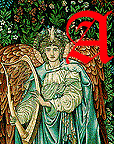The Chartist fiasco of 10 April 1848 brought together the three men who together gave Christian socialism its name and being: Maurice the Platonic philosopher and Anglican divine, Kingsley the preacher, and Ludlow the socialist. Ludlow proffered the social ideas, Kingsley the prophetic fire, Maurice the anchorage in Christian doctrine. In this unusual crew Ludlow stood at the helm, Kingsley flew the flags and sounded the horns, Maurice poked round the engine-room to see that the engines were of authentic Christian manufacture. — Owen Chadwick, The Victorian Church, 351

fter what Owen Chadwick describes as “the Chartist fiasco of 10 April 1848,” F. D. Maurice, Charles Kingsley, and J. M. Ludlow, the founders of Christian Socialism, decided to publish a penny journal, Politics for the People, “sympathetic to the poor and based upon the acknowledgment that God rules in human society. . . . They addressed themselves to workmen. They confessed that they were not workmen, but asked for workmen’s help in bridging the gulf that divided them” (352). According to Chadwick, the newspaper “achieved few readers, but contains strong and intelligent writing,” much of the best of which came Ludlow, who argued for a large extension of the right to vote and the belief that “to be a Christian was to be in some form a radical.”
Charles Kingsley, writing under the pen-name of Parson Lot, made the most radical pronouncements:
‘My only quarrel with the Charter is, that it does not go far enough’. ‘Instead of being a book to keep the poor in order, it [the Bible] is a book, from beginning to end, written to keep the rich in order.’ ‘It is our fault. We have used the Bible as if it was a mere special constable’s handbook—an opium-dose for keeping beasts of burden patient while they were being over-loaded.’ Kingsley paraded the biblical texts which, nine years before, the Chartists sent up to the pulpits of harassed clergymen; ‘He that will not work, neither shall he eat’; ‘Go to now, ye rich men, weep and howl’. ‘You cry, and I cry, “A fair day’s wages for a fair day’s work”. And is not this the doctrine of the whole Bible. . . ?’ This was plain and courageous utterance. [352-53]
Chadwick admits that “Kingsley’s extremism vanished on close analysis,” but points out that after all he never “wrote for analysts” (353).
The Chartist Commonwealth attacked
Bibliography
Chadwick, Owen. The Victorian Church. London: Adam & Charles Black. 1966.
Last modified 18 June 2018